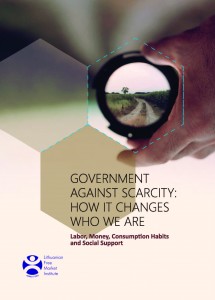
Free-market advocates have long claimed that scarcity – widely held to be the bedrock of economics and the natural state of the world – drives humanity to use resources as efficiently as possible. The counterclaim has been that scarcity is inherently a bad thing and that state-directed action can be taken to eradicate it. However, a recent interdisciplinary study by the
Lithuanian Free Market Institute (LFMI), an Atlas Network partner based in Vilnius, has validated the free-market view of scarcity and has examined the effects of state action taken to combat scarcity. The recently unveiled innovative research on scarcity brought expertise and outlooks from the fields of anthropology, economics, psychology, philosophy, sociology, and theology. LFMI’s handbook of public policy analysis, titled
Government Against Scarcity: How it Changes Who We Are and published on September 21, focuses on four areas – labor relations, money, consumption habits, and social support – where governments increasingly restrict individual freedom, choice, and initiative. The handbook is a continuation of an interdisciplinary peer-reviewed study published last year,
The Phenomenon of Scarcity: Being, Man and Community (link in Lithuanian).
The focus on the four areas of labor relations, money, consumption habits, and social support examines how state intervention crowds out voluntary decisions in each. It additionally introduces a new method of analysis in understanding the role that scarcity plays in human existence. One central takeaway is that, absent the peaceful cooperation that comes with free-market systems, the only other option is coercion through many means, from theft to war. Heavy government involvement in the name of reducing scarcity can result in perversion of morals and conceptions of justice. Perhaps one of the most significant outcomes of the study was the distinction between actual scarcity (positive scarcity) and secondary scarcity (negative scarcity). Secondary scarcity results from human error or imperfection.